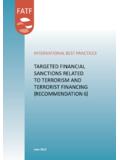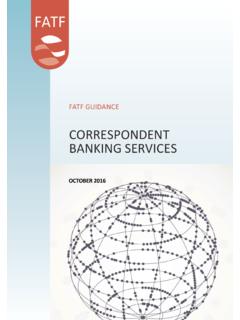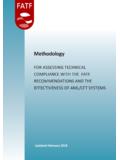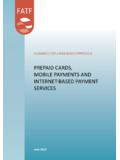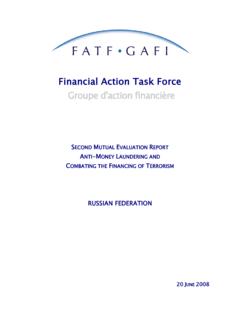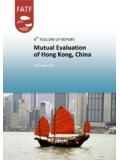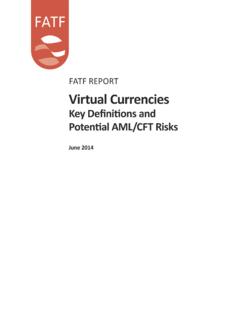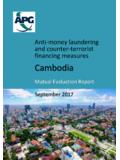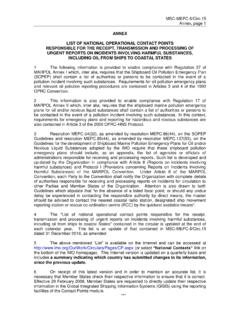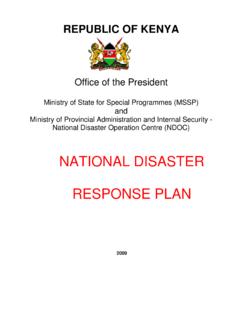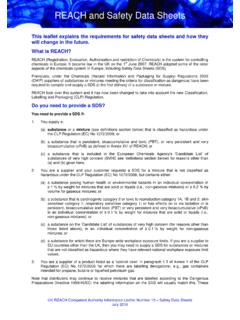Transcription of Operational Issues - Financial investigations …
1 Fatf report Operational Issues Financial investigations Guidance June 2012. Financial ACTION TASK FORCE. The Financial Action Task Force (FATF) is an independent inter-governmental body that develops and promotes policies to protect the global Financial system against money laundering, terrorist financing and the financing of proliferation of weapons of mass destruction. The FATF Recommendations are recognised as the global anti-money laundering (AML) and counter-terrorist financing (CFT) standard. For more information about the FATF, please visit the website: 2012 FATF/OECD. All rights reserved. No reproduction or translation of this publication may be made without prior written permission.
2 Applications for such permission, for all or part of this publication, should be made to the FATF Secretariat, 2 rue Andr Pascal 75775 Paris Cedex 16, France (fax: +33 1 44 30 61 37 or e-mail: Photocredits coverphoto: Thinkstock Operational Issues - Financial investigations Guidance TABLE OF CONTENTS. I. PURPOSE OF THE 3. Standards Related to Law 4. Objectives and Benefits of Financial investigation .. 6. II. Operational FRAMEWORK .. 8. Investigative Strategy .. 8. Parallel investigations .. 9. Multi-disciplinary Groups or Task Forces .. 10. Asset Recovery .. 11. Registries .. 13. III. TERRORIST 15. IV. SOURCES OF INFORMATION.)
3 17. Data Sources and Types of Information .. 17. V. LAW ENFORCEMENT COLLABORATION WITH Financial INTELLIGENCE. UNITS (FIU).. 20. FIU and AML/CFT disclosures in Financial investigations .. 20. Law Enforcement Utilisation of AML/CFT Disclosures and FIU Analysis in Financial investigations .. 21. Accessibility of FIUs to Enhance Financial investigations .. 22. Review of STR Information and other AML/CFT Disclosures .. 22. Review of Cross Border Cash Declarations for Financial investigations .. 23. VI. INVESTIGATIVE TECHNIQUES .. 25. VII. TRAINING .. 29. VIII. INTERNATIONAL 31. ANNEX ADDITIONAL INFORMATION .. 33. SELECTED SOURCES OF INFORMATION FOR Financial investigation .
4 37. 2012 OECD/FATF 1. Operational Issues - Financial investigations Guidance 2 2012 OECD/FATF. Operational Issues - Financial investigations Guidance Financial investigations GUIDANCE. I. PURPOSE OF THE GUIDANCE. 1. During the latest revision of Financial Action Task Force (FATF) standards, greater attention was given to the Operational anti-money laundering/countering the financing of terrorism (AML/CFT) framework. One goal was to strengthen the law enforcement standards (Recommendations 30 and 31) to enhance the functions, responsibilities, powers and tools of law enforcement to effectively conduct money laundering (ML), terrorism financing (TF) and asset- tracing investigations .
5 The revised standards now recognise Financial investigations as one of the core elements of the FATF's Operational and law enforcement Recommendations. This guidance note is not a standard or interpretative note and is only intended to help countries better understand law enforcement's role in the larger AML/CFT context, specifically addressing the role of Financial investigations . The intention of this guidance note is to assist policy makers as well as practitioners by providing ideas and concepts that they can incorporate into their AML/CFT. frameworks that might lead to more effective Financial investigations .
6 These ideas can go beyond the scope of the standards but are intended to provide examples of ways in which countries conduct Financial investigations . As an added benefit, the guidance can also be useful to future AML/CFT. assessments and could assist countries in improving the effectiveness of the Operational AML/CFT. regime. 2. The term Financial investigation , for the purpose of this guidance note, means an enquiry into the Financial affairs related to criminal conduct. The major goal of a Financial investigation is to identify and document the movement of money during the course of criminal activity. The link between the origins of the money, beneficiaries, when the money is received and where it is stored or deposited can provide information about and proof of criminal By identifying the extent of criminal networks, the scale of criminality, by tracing proceeds of crime, terrorist funds and other proceeds subject to confiscation and by developing evidence which can be used in criminal proceedings, the overall effectiveness of a country's AML/CFT regime will be enhanced.
7 This guidance contains overarching concepts, strategies and techniques which are meant to be applicable to different legal systems and different types of Operational frameworks and is intended to assist countries on how best to implement the FATF Recommendations associated with conducting Financial investigations . This guidance will highlight areas where training and technical assistance for Financial investigators and prosecutors2 can be sought but is not to be viewed as a training manual on Financial investigations . Throughout the document references are made to information that provides further detail on Financial 3.
8 Before any of the requirements of the FATF standards can be implemented by Operational authorities, a comprehensive legal framework is necessary to underpin these requirements, and the 1 See FATF (2012), Interpretative Note to Recommendation 30, 2nd paragraph. 2 For the purposes of this guidance note the term prosecutor also includes investigative magistrate and investigative judge 3 See also the list of selected sources relating to Financial investigation at the end of this document. 2012 OECD/FATF 3. Operational Issues - Financial investigations Guidance use of investigative techniques can only be applied if they are permitted by and within the possibilities of the basic principles of a country's domestic legal system.
9 This guidance will highlight elements of the Palermo Convention4 which are necessary to implement many of the law enforcement powers and techniques described in this guidance. STANDARDS RELATED TO LAW ENFORCEMENT. 4. The FATF Recommendations are designed to detect illicit Financial activity, protect the integrity of Financial markets, bring criminals to justice and prevent threats to national security. Law enforcement should seek to prevent, deter and disrupt ML, associated predicate offences, the financing of proliferation of weapons of mass destruction and TF activity. Also, law enforcement should be aiming to deprive criminals of their illicit proceeds and terrorists of the resources needed to finance their activities.
10 For the purposes of this guidance note which seeks to clarify the role of law enforcement in conducting Financial investigations the following FATF Recommendations are relevant: 5. National cooperation and coordination: According to the new standards, each country should have a national policy on anti-money laundering and counter terrorist financing, (Recommendation 2). This policy should be informed by the risks identified, and such policy should be regularly reviewed in order to ensure that it stays accurate and contemporary. Knowledge acquired through Financial investigations can be used for risk assessment and monitoring purposes.
